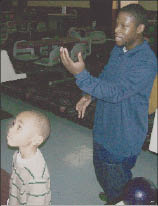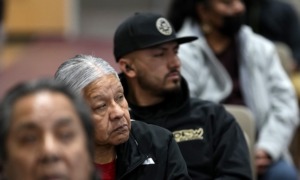Ann Arbor, Mich.—When Shenida Smith turned to the local Big Brothers Big Sisters organization last year to find mentors for her two oldest children after her husband’s unexpected death, she got a familiar response that reflects a problem that has been troubling America’s largest mentoring agency for years.
While finding a female mentor for her daughter, Shalae, 8, would be a cinch, finding a male mentor for her son, Dorrian, 7, would be a whole different story.
“They said it would take up to a year for Dorrian” to be matched with a mentor, Smith recalled recently in the living room of her home. A drawing that Shalae made of her stepfather, Khalil Smith, sat on an end table with the words R.I.P. Dad written on the wooden frame – a somber reminder of his untimely death at the age of 36.
 |
|
Striking friendship: Dorrian Smith, 7, and Matthew Coats, his big at one of their favorite hangouts: the Ypsi-Arbor Lanes in Ypsilanti, Mich. |
In order to keep her son under the tutelage of a black man after her husband’s death, Smith specified that she wanted an African-American mentor. And her son said he wanted his mentor to be an “Alpha man,” like his stepdad – a member of the national black fraternity Alpha Phi Alpha.
At first blush, the specificity of their request might seem inordinately exclusive. But looked at differently, it represents a strategic approach toward finding mentors that Big Brothers Big Sisters is adopting to boost the number of black men who serve as mentors within its ranks.
Under a new partnership, the three largest black fraternities in the United States – Alpha Phi Alpha, Kappa Alpha Psi and Omega Psi Phi – are encouraging their combined 385,000 members to serve as mentors at Big Brothers Big Sisters of America (BBBSA).
Leaders of the fraternities say a new partnership will help the agency provide high-quality matches in a timely manner and, they hope, eliminate the need for waiting lists.
“The majority of us have college educations. We have a network that’s been in place for 100 years,” said Dale Long, national chairman of Alpha Phi Alpha’s Big Brothers Big Sisters of America Partnership, referring to the black fraternities.
“If my Little says he wants to be an architect or a physician or a radio personality or journalist or a mayor, I have somebody I can hook him up with, sometimes just by making a call,” Long said.
That’s essentially what happened when Shenida Smith tired of waiting for her son to be matched with a mentor through Big Brothers Big Sisters, a $260 million-a-year organization that serves about 255,000 youth per year with a combination of private and federal funds.
Initially, Smith was willing to wait and see if BBBSA could find a mentor for Dorrian in less time than the year the agency projected. But after about six months, with Dorrian still on the waiting list, Smith decided to tackle the matter herself and turned to her husband’s fraternity – Alpha Phi Alpha – with an impassioned plea for help.
Within weeks, Dorrian had a mentor. He is Matthew Coats, a 33-year-old General Motors quality control supervisor who signed up to become a Big Brother after hearing of Smith’s plight. An “Alpha man” like Khalil Smith, Coats said he responded out of a sense of obligation to his deceased fraternity brother.
“When I heard the story, I had no other choice,” Coats recalled recently, while bowling with Dorrian at the Ypsi-Arbor Lanes in nearby Ypsilanti.
Coats and Dorrian exchanged high-fives during frames of bowling, as Dorrian did his best to use his small frame to push a six-pound black ball with enough force to get it down the bumper-guarded lane.
Smith’s success in finding a mentor for her young son is more than just an anecdote. Rather, it offers a series of instructive lessons for any youth-serving agency seeking to increase the number of male mentors, particularly minorities, within its mentoring base.
First: Be on guard against the “waiting-list mentality” and the inertia it seems to create; start reaching out to other community organizations and do so with a sense of urgency.
Second: Be cognizant of the fact that personal connections – like Shenida Smith’s husband’s affiliation with a black fraternity – go a long way. Personal stories, such as her children’s sudden, unexpected loss of their father, can also spur action, although experts caution that they must be used sparingly.
Seeking black males
BBBSA has struggled to match African-American boys with black mentors for years.
Of the roughly 255,000 youths served by Big Brothers Big Sisters – the agency calls them littles – roughly 94,000 are African-American, and 44 percent of the African-Americans, or about 41,000, are boys. However, among the roughly 255,000 mentors within the agency – referred to as bigs – only about 43,000 are African-American, and of that figure, only 35 percent, or about 15,000, are men.
That means there are about 26,000 more African-American male littles than there are African-American male bigs.
BBBSA does not track the average amount of time that children spend on its waiting list, but black children top the list.
According to figures provided by the agency, roughly 39 percent of the children on its “ready-to-be-matched” list are black, while only 29 percent are white and roughly 18 percent are Hispanic.
The percentages are about the same for both genders within each ethnic group, although the percentage is slightly higher for white and black boys, and somewhat lower for Hispanic boys.
Nationally, among African-American boys, only 28 percent are matched with African-American bigs, and 6 percent are matched with women. The rest are matched with male mentors of another race.
Here in Ann Arbor, the disparities are even greater. Among youths served in the program, roughly 65 percent are African-American, but the matches between African-American bigs and littles have fluctuated between 7 percent and 12 percent over the past five years.
Faced with this ongoing paucity of black male mentors, BBBSA recently redoubled its efforts within black fraternities, holding a summit in Atlanta in December with the biggest three, and with an eye on two other black fraternities.
As a result, the partnering black fraternities have set aside their historical, trivial rivalries and committed to build relationships among their chapters and others in order to encourage more black men to become mentors. They plan to recruit black men in barbershops, at Final Four parties and any other places and events likely to draw large numbers of black men.
In many ways, by working with the fraternities, BBBSA is making use of the findings of a 2007 report it commissioned on how to increase the number of black men who mentor. (See “Soul Searching,” page 20.)
BBBSA’s ties with a black fraternity is nothing new. The agency first forged a relationship with Alpha Phi Alpha almost 20 years ago. But it didn’t really materialize in any meaningful way until recent years, said Long, who leads that partnership for the fraternity.
And in the mid-1990s, Alpha Phi Alpha received $400,000 from the W.K. Kellogg Foundation for its Sankofa Project to pair African-American men with boys, as part of the foundation’s $11 million African-American Men and Boys Initiative.
Today, about 4,500 Alphas serve BBBSA in some capacity, Long said, although not all of them are mentors and many serve on boards or as fundraisers and the like.
For its part, BBBSA has committed to do more to sustain a relationship among its leadership and the leadership of both collegiate and alumni chapters of the three black fraternities. For example, BBBSA is appointing a liaison to the fraternities and plans to have staff members attend all regional and national conventions of the fraternities.
Smith’s case illustrates the strong bonds among black fraternity members. She originally had sought help from her husband’s fraternity, which had referred her to Big Brothers Big Sisters. But after her son remained on the waiting list, she turned her attention back to the fraternity and discovered through Internet searching that Alpha Phi Alpha was already a national partner with Big Brothers Big Sisters.
Using e-mail, Smith made a plea to encourage fraternity members to serve as mentors through Big Brothers Big Sisters. Her e-mail told of how her husband died shortly before Christmas in 2008 while she was out running an errand. She included a video memorial of her husband and concluded by saying:
“By you becoming a Big, you can impact a little boy’s life positively. My son is 6 right now and he still listens to his mommy. My husband always said a woman can raise a man but he really needs a man to teach him to be a man.
“I’m not searching for a father for my son, but I am hoping for a mentor. My husband put down a good foundation for our sons, but I fear that the things he taught won’t stick as the years go on and they grow into men (with all these other influences).
“And it would be good for them to continue to see African American MEN becoming educated, working, and being stand up citizens of the community.”
Among those who received Smith’s e-mail was Long.
“I couldn’t wait to start working on that,” Long said of Smith’s request for an Alpha mentor.
Long contacted his Alpha fraternity brothers in the Midwest and ultimately got in touch with the Ann Arbor chapter.
“That’s how that network works,” he said, explaining that when he reaches out to his fraternity brothers, his calls are treated differently from a call from a stranger. “That’s the value of that network.”
Smith said she believes if she hadn’t sought help from her husband’s fraternity, Dorrian might still be on the Big Brothers Big Sisters waiting list. But she doesn’t fault the agency for how long it took to find a match for her son.
“They can only match what they have,” Smith said. “If more men would reach out to be a Big Brother, the wait wouldn’t be so long.”
Contact: BBBSA (215) 567-7000, http://www.bbbs.org.






























